Report: Sustainable Tourism Development and Management - February 2019
VerifiedAdded on 2023/03/30
|13
|2577
|438
Report
AI Summary
This report critically examines sustainable tourism development, focusing on contemporary issues, responsible practices, and their impact on stakeholders and management approaches. It provides key definitions of sustainable and responsible tourism, explores challenges, and analyzes the relationship between responsible tourism and sustainability. The report synthesizes research articles and seminal papers to evaluate sustainability practices in various destinations, including ethical tourism and waste management techniques. It identifies tourism development approaches and reveals the positive influence of responsible tourism practices on long-term sustainability. The report also includes a discussion of the research strategy, a detailed literature review of key papers, and concludes with recommendations for alternative frameworks to help tourist destination management and stakeholders to adhere to global systems and principles of sustainable tourism development.
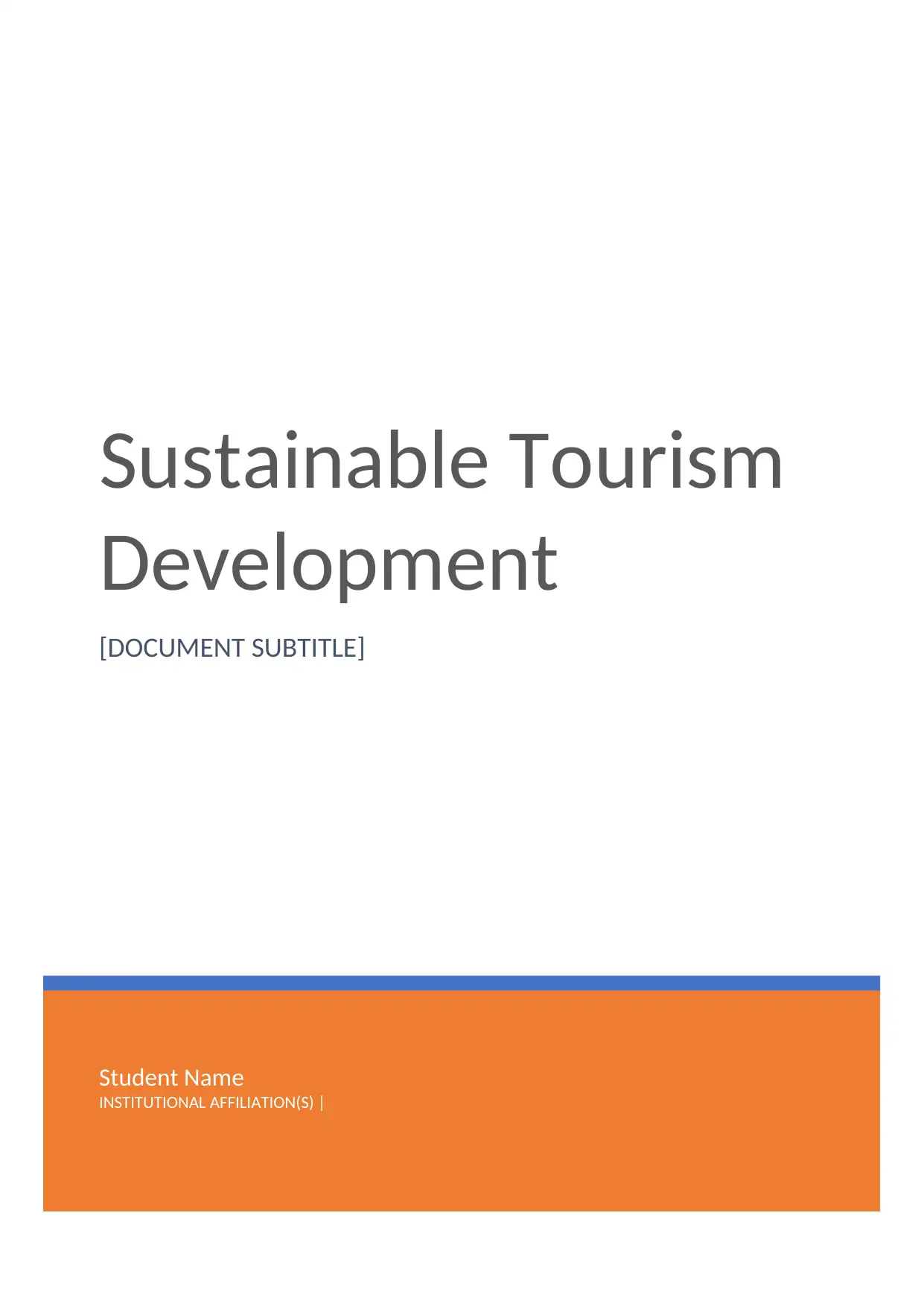
Student Name
INSTITUTIONAL AFFILIATION(S) |
Sustainable Tourism
Development
[DOCUMENT SUBTITLE]
INSTITUTIONAL AFFILIATION(S) |
Sustainable Tourism
Development
[DOCUMENT SUBTITLE]
Paraphrase This Document
Need a fresh take? Get an instant paraphrase of this document with our AI Paraphraser
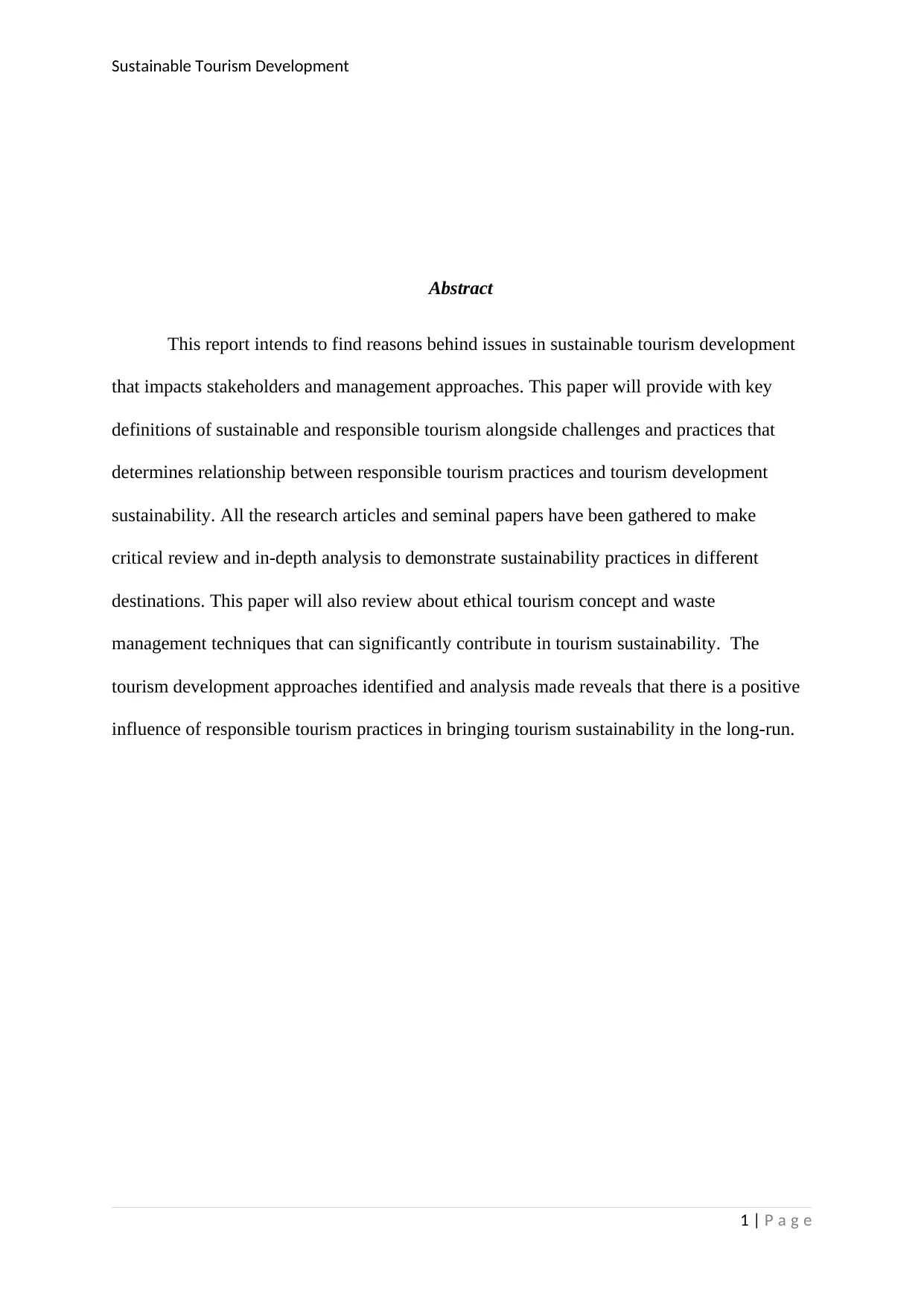
Sustainable Tourism Development
Abstract
This report intends to find reasons behind issues in sustainable tourism development
that impacts stakeholders and management approaches. This paper will provide with key
definitions of sustainable and responsible tourism alongside challenges and practices that
determines relationship between responsible tourism practices and tourism development
sustainability. All the research articles and seminal papers have been gathered to make
critical review and in-depth analysis to demonstrate sustainability practices in different
destinations. This paper will also review about ethical tourism concept and waste
management techniques that can significantly contribute in tourism sustainability. The
tourism development approaches identified and analysis made reveals that there is a positive
influence of responsible tourism practices in bringing tourism sustainability in the long-run.
1 | P a g e
Abstract
This report intends to find reasons behind issues in sustainable tourism development
that impacts stakeholders and management approaches. This paper will provide with key
definitions of sustainable and responsible tourism alongside challenges and practices that
determines relationship between responsible tourism practices and tourism development
sustainability. All the research articles and seminal papers have been gathered to make
critical review and in-depth analysis to demonstrate sustainability practices in different
destinations. This paper will also review about ethical tourism concept and waste
management techniques that can significantly contribute in tourism sustainability. The
tourism development approaches identified and analysis made reveals that there is a positive
influence of responsible tourism practices in bringing tourism sustainability in the long-run.
1 | P a g e
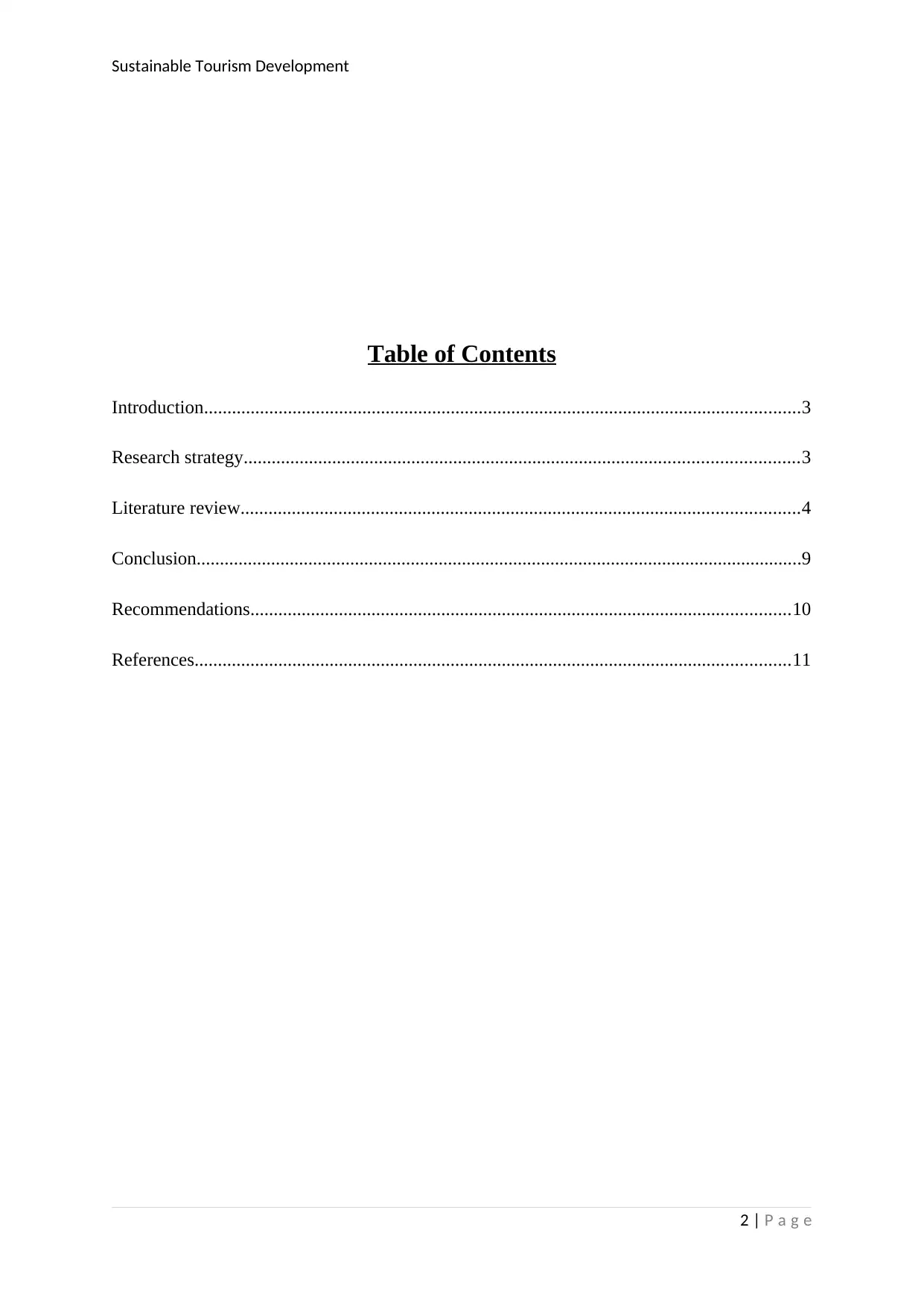
Sustainable Tourism Development
Table of Contents
Introduction................................................................................................................................3
Research strategy.......................................................................................................................3
Literature review........................................................................................................................4
Conclusion..................................................................................................................................9
Recommendations....................................................................................................................10
References................................................................................................................................11
2 | P a g e
Table of Contents
Introduction................................................................................................................................3
Research strategy.......................................................................................................................3
Literature review........................................................................................................................4
Conclusion..................................................................................................................................9
Recommendations....................................................................................................................10
References................................................................................................................................11
2 | P a g e
⊘ This is a preview!⊘
Do you want full access?
Subscribe today to unlock all pages.

Trusted by 1+ million students worldwide
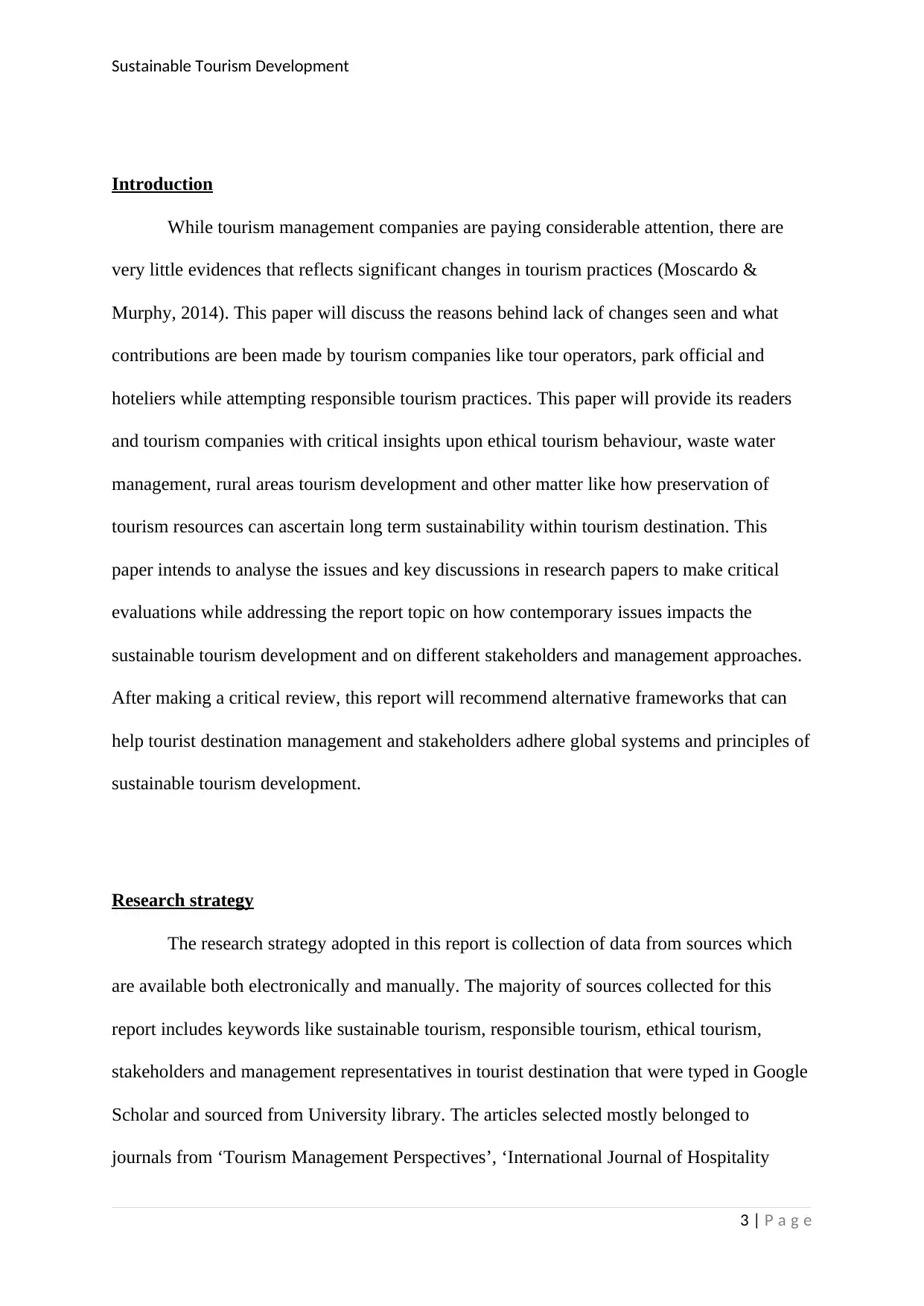
Sustainable Tourism Development
Introduction
While tourism management companies are paying considerable attention, there are
very little evidences that reflects significant changes in tourism practices (Moscardo &
Murphy, 2014). This paper will discuss the reasons behind lack of changes seen and what
contributions are been made by tourism companies like tour operators, park official and
hoteliers while attempting responsible tourism practices. This paper will provide its readers
and tourism companies with critical insights upon ethical tourism behaviour, waste water
management, rural areas tourism development and other matter like how preservation of
tourism resources can ascertain long term sustainability within tourism destination. This
paper intends to analyse the issues and key discussions in research papers to make critical
evaluations while addressing the report topic on how contemporary issues impacts the
sustainable tourism development and on different stakeholders and management approaches.
After making a critical review, this report will recommend alternative frameworks that can
help tourist destination management and stakeholders adhere global systems and principles of
sustainable tourism development.
Research strategy
The research strategy adopted in this report is collection of data from sources which
are available both electronically and manually. The majority of sources collected for this
report includes keywords like sustainable tourism, responsible tourism, ethical tourism,
stakeholders and management representatives in tourist destination that were typed in Google
Scholar and sourced from University library. The articles selected mostly belonged to
journals from ‘Tourism Management Perspectives’, ‘International Journal of Hospitality
3 | P a g e
Introduction
While tourism management companies are paying considerable attention, there are
very little evidences that reflects significant changes in tourism practices (Moscardo &
Murphy, 2014). This paper will discuss the reasons behind lack of changes seen and what
contributions are been made by tourism companies like tour operators, park official and
hoteliers while attempting responsible tourism practices. This paper will provide its readers
and tourism companies with critical insights upon ethical tourism behaviour, waste water
management, rural areas tourism development and other matter like how preservation of
tourism resources can ascertain long term sustainability within tourism destination. This
paper intends to analyse the issues and key discussions in research papers to make critical
evaluations while addressing the report topic on how contemporary issues impacts the
sustainable tourism development and on different stakeholders and management approaches.
After making a critical review, this report will recommend alternative frameworks that can
help tourist destination management and stakeholders adhere global systems and principles of
sustainable tourism development.
Research strategy
The research strategy adopted in this report is collection of data from sources which
are available both electronically and manually. The majority of sources collected for this
report includes keywords like sustainable tourism, responsible tourism, ethical tourism,
stakeholders and management representatives in tourist destination that were typed in Google
Scholar and sourced from University library. The articles selected mostly belonged to
journals from ‘Tourism Management Perspectives’, ‘International Journal of Hospitality
3 | P a g e
Paraphrase This Document
Need a fresh take? Get an instant paraphrase of this document with our AI Paraphraser
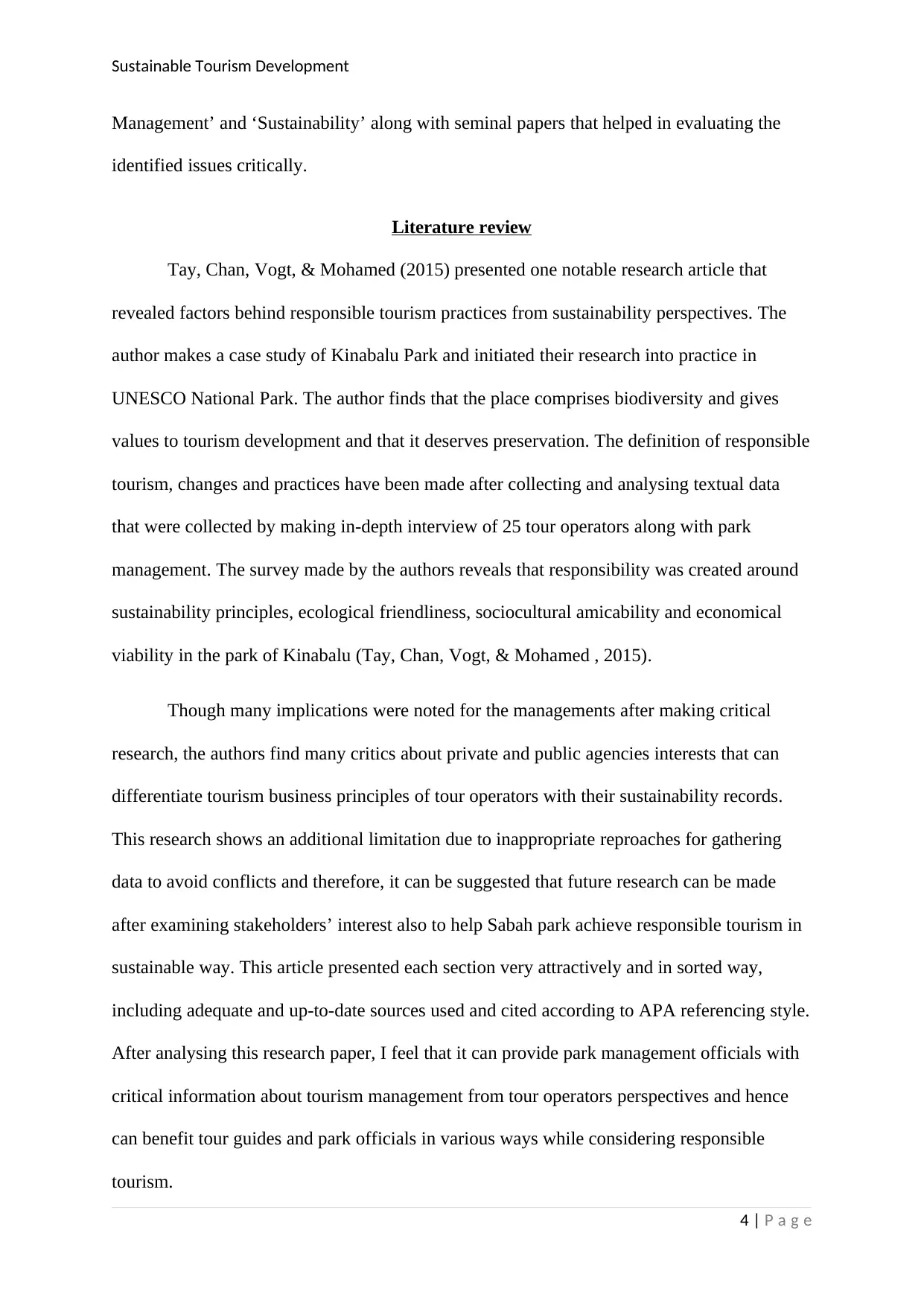
Sustainable Tourism Development
Management’ and ‘Sustainability’ along with seminal papers that helped in evaluating the
identified issues critically.
Literature review
Tay, Chan, Vogt, & Mohamed (2015) presented one notable research article that
revealed factors behind responsible tourism practices from sustainability perspectives. The
author makes a case study of Kinabalu Park and initiated their research into practice in
UNESCO National Park. The author finds that the place comprises biodiversity and gives
values to tourism development and that it deserves preservation. The definition of responsible
tourism, changes and practices have been made after collecting and analysing textual data
that were collected by making in-depth interview of 25 tour operators along with park
management. The survey made by the authors reveals that responsibility was created around
sustainability principles, ecological friendliness, sociocultural amicability and economical
viability in the park of Kinabalu (Tay, Chan, Vogt, & Mohamed , 2015).
Though many implications were noted for the managements after making critical
research, the authors find many critics about private and public agencies interests that can
differentiate tourism business principles of tour operators with their sustainability records.
This research shows an additional limitation due to inappropriate reproaches for gathering
data to avoid conflicts and therefore, it can be suggested that future research can be made
after examining stakeholders’ interest also to help Sabah park achieve responsible tourism in
sustainable way. This article presented each section very attractively and in sorted way,
including adequate and up-to-date sources used and cited according to APA referencing style.
After analysing this research paper, I feel that it can provide park management officials with
critical information about tourism management from tour operators perspectives and hence
can benefit tour guides and park officials in various ways while considering responsible
tourism.
4 | P a g e
Management’ and ‘Sustainability’ along with seminal papers that helped in evaluating the
identified issues critically.
Literature review
Tay, Chan, Vogt, & Mohamed (2015) presented one notable research article that
revealed factors behind responsible tourism practices from sustainability perspectives. The
author makes a case study of Kinabalu Park and initiated their research into practice in
UNESCO National Park. The author finds that the place comprises biodiversity and gives
values to tourism development and that it deserves preservation. The definition of responsible
tourism, changes and practices have been made after collecting and analysing textual data
that were collected by making in-depth interview of 25 tour operators along with park
management. The survey made by the authors reveals that responsibility was created around
sustainability principles, ecological friendliness, sociocultural amicability and economical
viability in the park of Kinabalu (Tay, Chan, Vogt, & Mohamed , 2015).
Though many implications were noted for the managements after making critical
research, the authors find many critics about private and public agencies interests that can
differentiate tourism business principles of tour operators with their sustainability records.
This research shows an additional limitation due to inappropriate reproaches for gathering
data to avoid conflicts and therefore, it can be suggested that future research can be made
after examining stakeholders’ interest also to help Sabah park achieve responsible tourism in
sustainable way. This article presented each section very attractively and in sorted way,
including adequate and up-to-date sources used and cited according to APA referencing style.
After analysing this research paper, I feel that it can provide park management officials with
critical information about tourism management from tour operators perspectives and hence
can benefit tour guides and park officials in various ways while considering responsible
tourism.
4 | P a g e
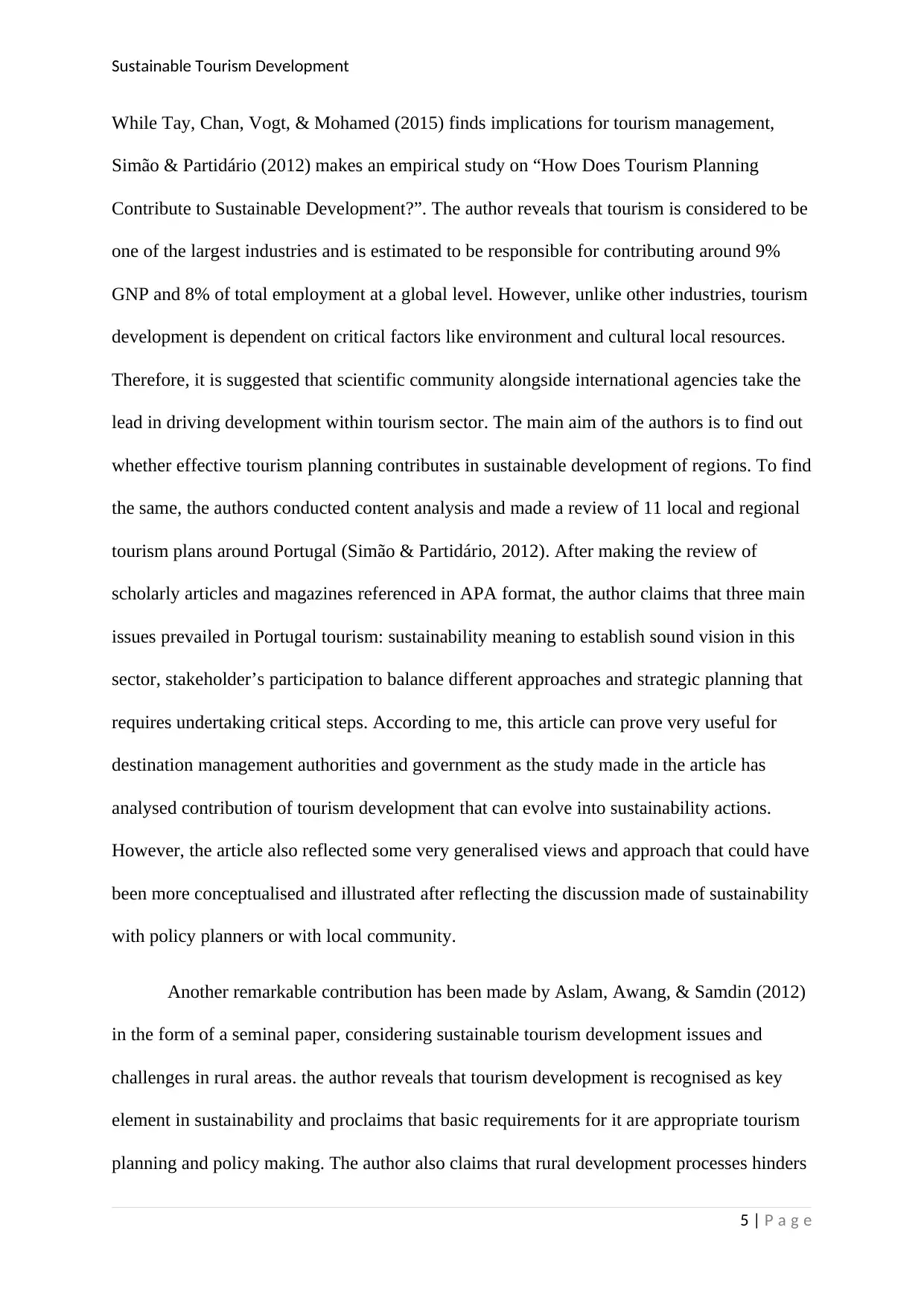
Sustainable Tourism Development
While Tay, Chan, Vogt, & Mohamed (2015) finds implications for tourism management,
Simão & Partidário (2012) makes an empirical study on “How Does Tourism Planning
Contribute to Sustainable Development?”. The author reveals that tourism is considered to be
one of the largest industries and is estimated to be responsible for contributing around 9%
GNP and 8% of total employment at a global level. However, unlike other industries, tourism
development is dependent on critical factors like environment and cultural local resources.
Therefore, it is suggested that scientific community alongside international agencies take the
lead in driving development within tourism sector. The main aim of the authors is to find out
whether effective tourism planning contributes in sustainable development of regions. To find
the same, the authors conducted content analysis and made a review of 11 local and regional
tourism plans around Portugal (Simão & Partidário, 2012). After making the review of
scholarly articles and magazines referenced in APA format, the author claims that three main
issues prevailed in Portugal tourism: sustainability meaning to establish sound vision in this
sector, stakeholder’s participation to balance different approaches and strategic planning that
requires undertaking critical steps. According to me, this article can prove very useful for
destination management authorities and government as the study made in the article has
analysed contribution of tourism development that can evolve into sustainability actions.
However, the article also reflected some very generalised views and approach that could have
been more conceptualised and illustrated after reflecting the discussion made of sustainability
with policy planners or with local community.
Another remarkable contribution has been made by Aslam, Awang, & Samdin (2012)
in the form of a seminal paper, considering sustainable tourism development issues and
challenges in rural areas. the author reveals that tourism development is recognised as key
element in sustainability and proclaims that basic requirements for it are appropriate tourism
planning and policy making. The author also claims that rural development processes hinders
5 | P a g e
While Tay, Chan, Vogt, & Mohamed (2015) finds implications for tourism management,
Simão & Partidário (2012) makes an empirical study on “How Does Tourism Planning
Contribute to Sustainable Development?”. The author reveals that tourism is considered to be
one of the largest industries and is estimated to be responsible for contributing around 9%
GNP and 8% of total employment at a global level. However, unlike other industries, tourism
development is dependent on critical factors like environment and cultural local resources.
Therefore, it is suggested that scientific community alongside international agencies take the
lead in driving development within tourism sector. The main aim of the authors is to find out
whether effective tourism planning contributes in sustainable development of regions. To find
the same, the authors conducted content analysis and made a review of 11 local and regional
tourism plans around Portugal (Simão & Partidário, 2012). After making the review of
scholarly articles and magazines referenced in APA format, the author claims that three main
issues prevailed in Portugal tourism: sustainability meaning to establish sound vision in this
sector, stakeholder’s participation to balance different approaches and strategic planning that
requires undertaking critical steps. According to me, this article can prove very useful for
destination management authorities and government as the study made in the article has
analysed contribution of tourism development that can evolve into sustainability actions.
However, the article also reflected some very generalised views and approach that could have
been more conceptualised and illustrated after reflecting the discussion made of sustainability
with policy planners or with local community.
Another remarkable contribution has been made by Aslam, Awang, & Samdin (2012)
in the form of a seminal paper, considering sustainable tourism development issues and
challenges in rural areas. the author reveals that tourism development is recognised as key
element in sustainability and proclaims that basic requirements for it are appropriate tourism
planning and policy making. The author also claims that rural development processes hinders
5 | P a g e
⊘ This is a preview!⊘
Do you want full access?
Subscribe today to unlock all pages.

Trusted by 1+ million students worldwide
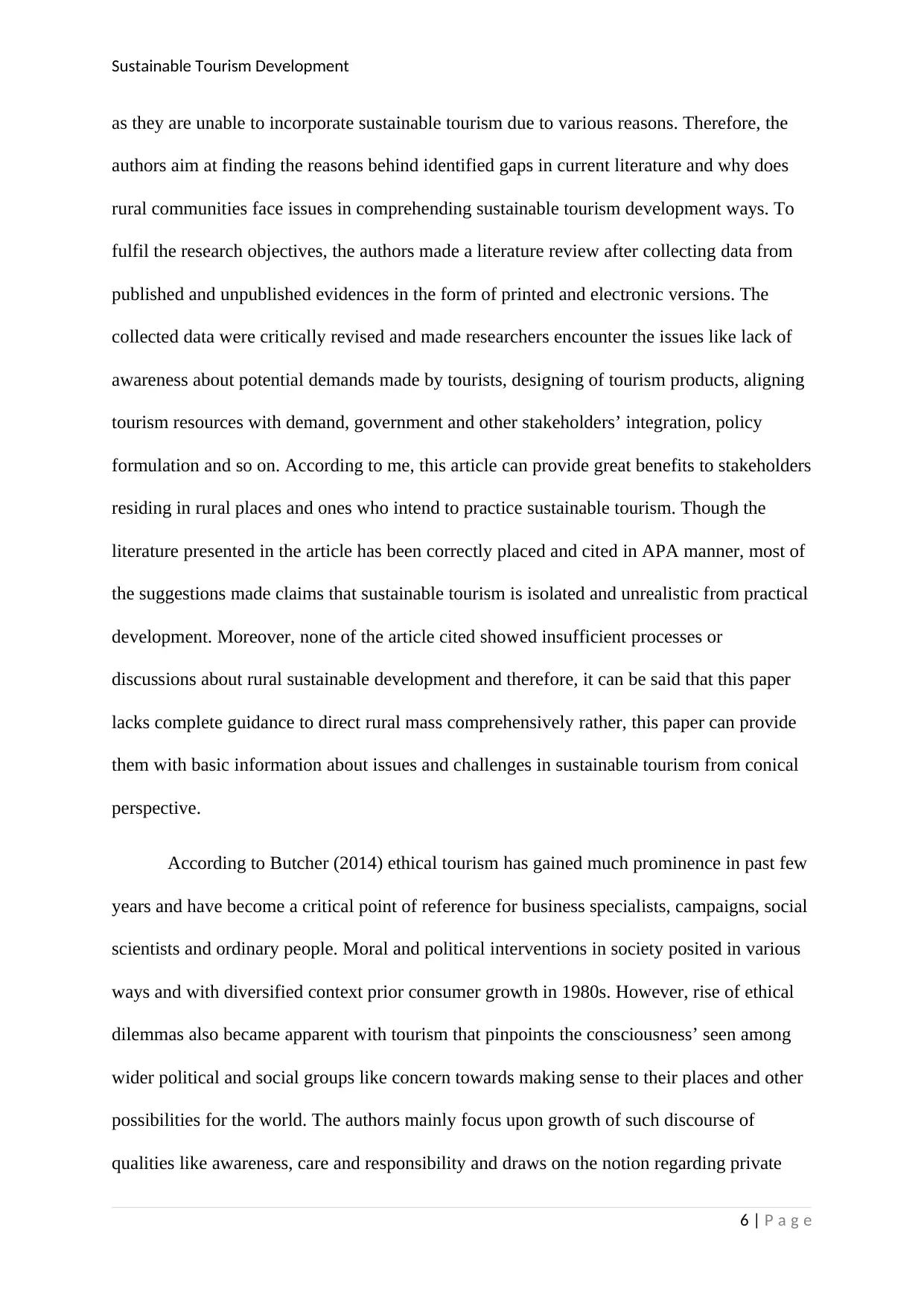
Sustainable Tourism Development
as they are unable to incorporate sustainable tourism due to various reasons. Therefore, the
authors aim at finding the reasons behind identified gaps in current literature and why does
rural communities face issues in comprehending sustainable tourism development ways. To
fulfil the research objectives, the authors made a literature review after collecting data from
published and unpublished evidences in the form of printed and electronic versions. The
collected data were critically revised and made researchers encounter the issues like lack of
awareness about potential demands made by tourists, designing of tourism products, aligning
tourism resources with demand, government and other stakeholders’ integration, policy
formulation and so on. According to me, this article can provide great benefits to stakeholders
residing in rural places and ones who intend to practice sustainable tourism. Though the
literature presented in the article has been correctly placed and cited in APA manner, most of
the suggestions made claims that sustainable tourism is isolated and unrealistic from practical
development. Moreover, none of the article cited showed insufficient processes or
discussions about rural sustainable development and therefore, it can be said that this paper
lacks complete guidance to direct rural mass comprehensively rather, this paper can provide
them with basic information about issues and challenges in sustainable tourism from conical
perspective.
According to Butcher (2014) ethical tourism has gained much prominence in past few
years and have become a critical point of reference for business specialists, campaigns, social
scientists and ordinary people. Moral and political interventions in society posited in various
ways and with diversified context prior consumer growth in 1980s. However, rise of ethical
dilemmas also became apparent with tourism that pinpoints the consciousness’ seen among
wider political and social groups like concern towards making sense to their places and other
possibilities for the world. The authors mainly focus upon growth of such discourse of
qualities like awareness, care and responsibility and draws on the notion regarding private
6 | P a g e
as they are unable to incorporate sustainable tourism due to various reasons. Therefore, the
authors aim at finding the reasons behind identified gaps in current literature and why does
rural communities face issues in comprehending sustainable tourism development ways. To
fulfil the research objectives, the authors made a literature review after collecting data from
published and unpublished evidences in the form of printed and electronic versions. The
collected data were critically revised and made researchers encounter the issues like lack of
awareness about potential demands made by tourists, designing of tourism products, aligning
tourism resources with demand, government and other stakeholders’ integration, policy
formulation and so on. According to me, this article can provide great benefits to stakeholders
residing in rural places and ones who intend to practice sustainable tourism. Though the
literature presented in the article has been correctly placed and cited in APA manner, most of
the suggestions made claims that sustainable tourism is isolated and unrealistic from practical
development. Moreover, none of the article cited showed insufficient processes or
discussions about rural sustainable development and therefore, it can be said that this paper
lacks complete guidance to direct rural mass comprehensively rather, this paper can provide
them with basic information about issues and challenges in sustainable tourism from conical
perspective.
According to Butcher (2014) ethical tourism has gained much prominence in past few
years and have become a critical point of reference for business specialists, campaigns, social
scientists and ordinary people. Moral and political interventions in society posited in various
ways and with diversified context prior consumer growth in 1980s. However, rise of ethical
dilemmas also became apparent with tourism that pinpoints the consciousness’ seen among
wider political and social groups like concern towards making sense to their places and other
possibilities for the world. The authors mainly focus upon growth of such discourse of
qualities like awareness, care and responsibility and draws on the notion regarding private
6 | P a g e
Paraphrase This Document
Need a fresh take? Get an instant paraphrase of this document with our AI Paraphraser
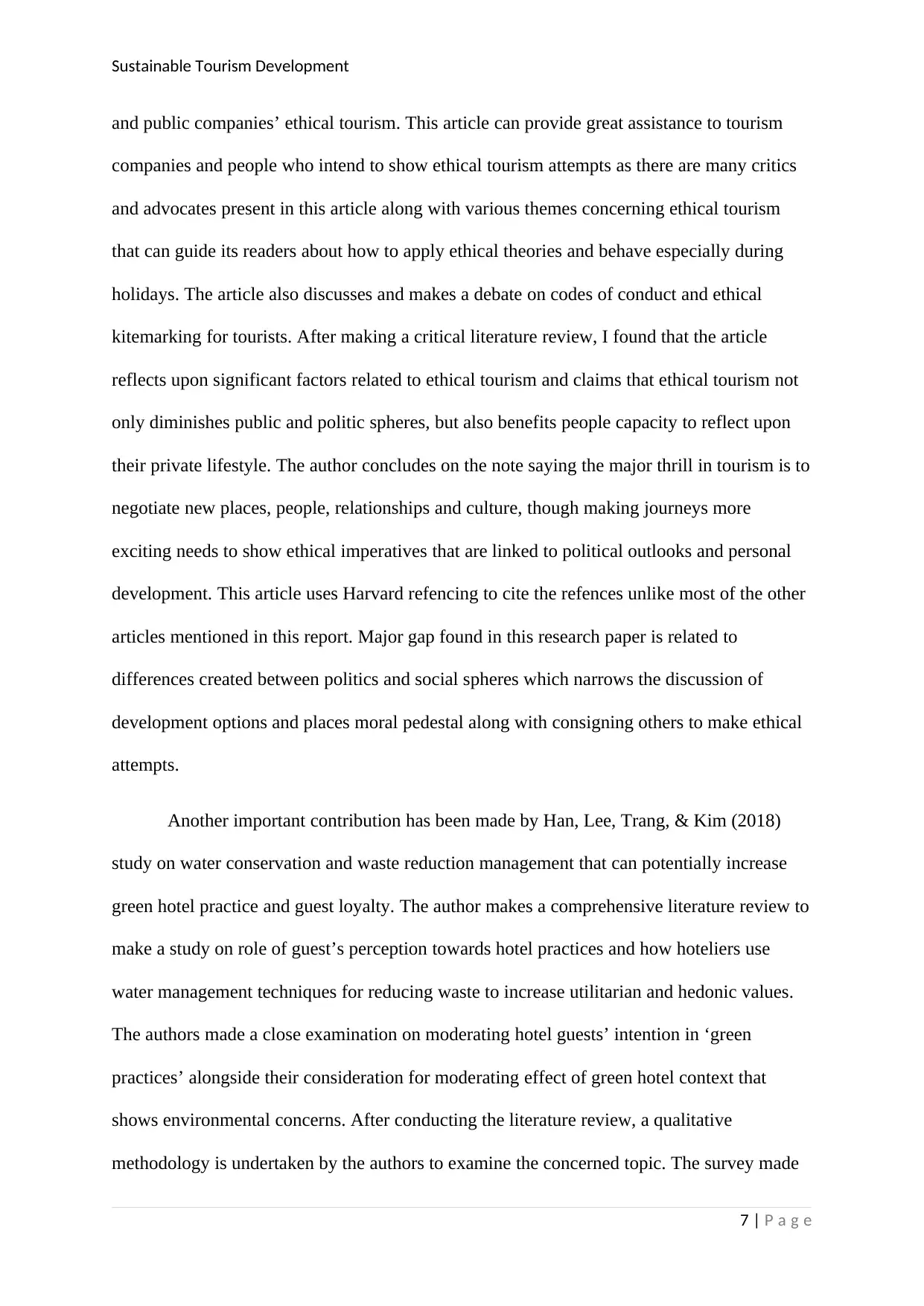
Sustainable Tourism Development
and public companies’ ethical tourism. This article can provide great assistance to tourism
companies and people who intend to show ethical tourism attempts as there are many critics
and advocates present in this article along with various themes concerning ethical tourism
that can guide its readers about how to apply ethical theories and behave especially during
holidays. The article also discusses and makes a debate on codes of conduct and ethical
kitemarking for tourists. After making a critical literature review, I found that the article
reflects upon significant factors related to ethical tourism and claims that ethical tourism not
only diminishes public and politic spheres, but also benefits people capacity to reflect upon
their private lifestyle. The author concludes on the note saying the major thrill in tourism is to
negotiate new places, people, relationships and culture, though making journeys more
exciting needs to show ethical imperatives that are linked to political outlooks and personal
development. This article uses Harvard refencing to cite the refences unlike most of the other
articles mentioned in this report. Major gap found in this research paper is related to
differences created between politics and social spheres which narrows the discussion of
development options and places moral pedestal along with consigning others to make ethical
attempts.
Another important contribution has been made by Han, Lee, Trang, & Kim (2018)
study on water conservation and waste reduction management that can potentially increase
green hotel practice and guest loyalty. The author makes a comprehensive literature review to
make a study on role of guest’s perception towards hotel practices and how hoteliers use
water management techniques for reducing waste to increase utilitarian and hedonic values.
The authors made a close examination on moderating hotel guests’ intention in ‘green
practices’ alongside their consideration for moderating effect of green hotel context that
shows environmental concerns. After conducting the literature review, a qualitative
methodology is undertaken by the authors to examine the concerned topic. The survey made
7 | P a g e
and public companies’ ethical tourism. This article can provide great assistance to tourism
companies and people who intend to show ethical tourism attempts as there are many critics
and advocates present in this article along with various themes concerning ethical tourism
that can guide its readers about how to apply ethical theories and behave especially during
holidays. The article also discusses and makes a debate on codes of conduct and ethical
kitemarking for tourists. After making a critical literature review, I found that the article
reflects upon significant factors related to ethical tourism and claims that ethical tourism not
only diminishes public and politic spheres, but also benefits people capacity to reflect upon
their private lifestyle. The author concludes on the note saying the major thrill in tourism is to
negotiate new places, people, relationships and culture, though making journeys more
exciting needs to show ethical imperatives that are linked to political outlooks and personal
development. This article uses Harvard refencing to cite the refences unlike most of the other
articles mentioned in this report. Major gap found in this research paper is related to
differences created between politics and social spheres which narrows the discussion of
development options and places moral pedestal along with consigning others to make ethical
attempts.
Another important contribution has been made by Han, Lee, Trang, & Kim (2018)
study on water conservation and waste reduction management that can potentially increase
green hotel practice and guest loyalty. The author makes a comprehensive literature review to
make a study on role of guest’s perception towards hotel practices and how hoteliers use
water management techniques for reducing waste to increase utilitarian and hedonic values.
The authors made a close examination on moderating hotel guests’ intention in ‘green
practices’ alongside their consideration for moderating effect of green hotel context that
shows environmental concerns. After conducting the literature review, a qualitative
methodology is undertaken by the authors to examine the concerned topic. The survey made
7 | P a g e
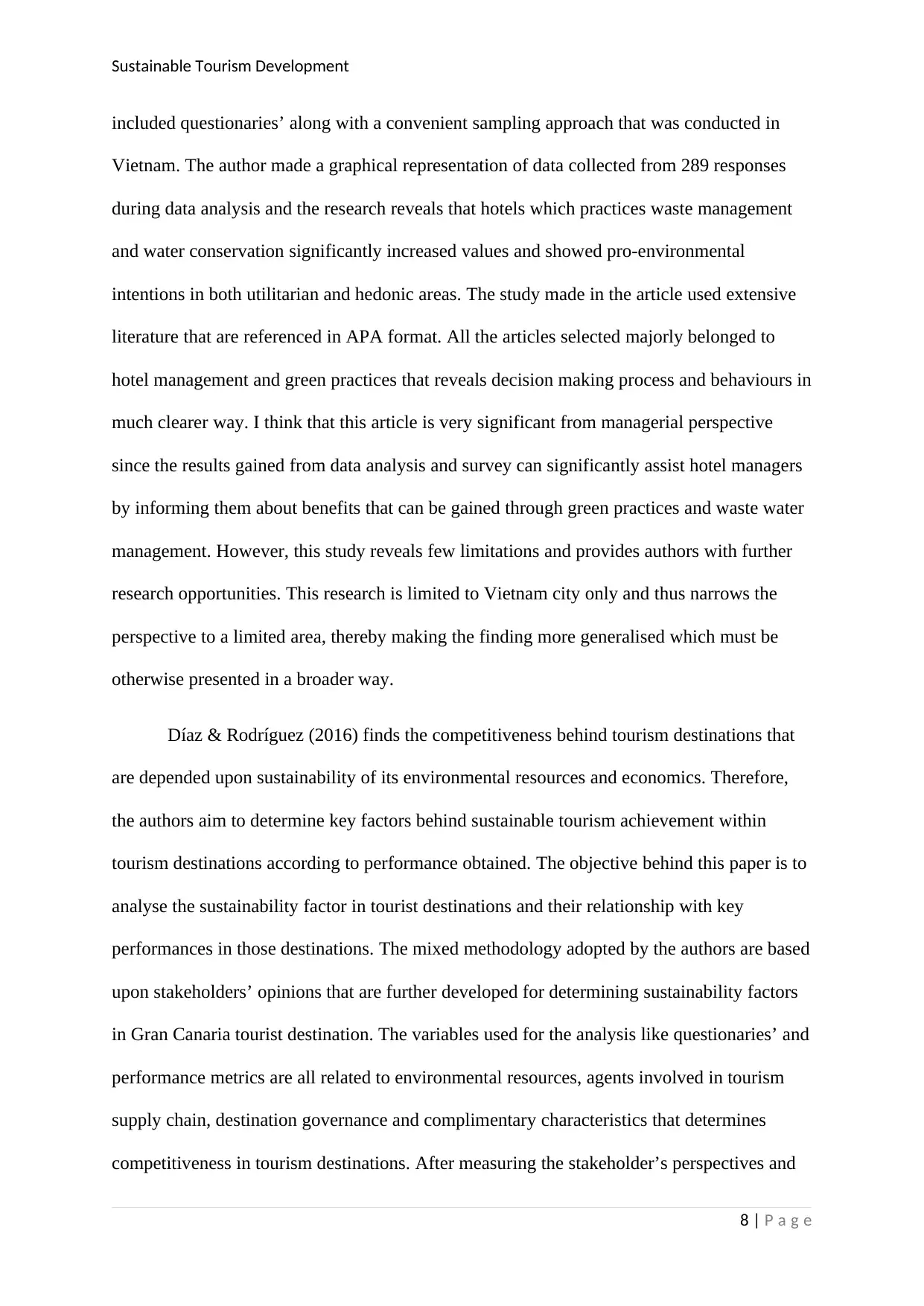
Sustainable Tourism Development
included questionaries’ along with a convenient sampling approach that was conducted in
Vietnam. The author made a graphical representation of data collected from 289 responses
during data analysis and the research reveals that hotels which practices waste management
and water conservation significantly increased values and showed pro-environmental
intentions in both utilitarian and hedonic areas. The study made in the article used extensive
literature that are referenced in APA format. All the articles selected majorly belonged to
hotel management and green practices that reveals decision making process and behaviours in
much clearer way. I think that this article is very significant from managerial perspective
since the results gained from data analysis and survey can significantly assist hotel managers
by informing them about benefits that can be gained through green practices and waste water
management. However, this study reveals few limitations and provides authors with further
research opportunities. This research is limited to Vietnam city only and thus narrows the
perspective to a limited area, thereby making the finding more generalised which must be
otherwise presented in a broader way.
Díaz & Rodríguez (2016) finds the competitiveness behind tourism destinations that
are depended upon sustainability of its environmental resources and economics. Therefore,
the authors aim to determine key factors behind sustainable tourism achievement within
tourism destinations according to performance obtained. The objective behind this paper is to
analyse the sustainability factor in tourist destinations and their relationship with key
performances in those destinations. The mixed methodology adopted by the authors are based
upon stakeholders’ opinions that are further developed for determining sustainability factors
in Gran Canaria tourist destination. The variables used for the analysis like questionaries’ and
performance metrics are all related to environmental resources, agents involved in tourism
supply chain, destination governance and complimentary characteristics that determines
competitiveness in tourism destinations. After measuring the stakeholder’s perspectives and
8 | P a g e
included questionaries’ along with a convenient sampling approach that was conducted in
Vietnam. The author made a graphical representation of data collected from 289 responses
during data analysis and the research reveals that hotels which practices waste management
and water conservation significantly increased values and showed pro-environmental
intentions in both utilitarian and hedonic areas. The study made in the article used extensive
literature that are referenced in APA format. All the articles selected majorly belonged to
hotel management and green practices that reveals decision making process and behaviours in
much clearer way. I think that this article is very significant from managerial perspective
since the results gained from data analysis and survey can significantly assist hotel managers
by informing them about benefits that can be gained through green practices and waste water
management. However, this study reveals few limitations and provides authors with further
research opportunities. This research is limited to Vietnam city only and thus narrows the
perspective to a limited area, thereby making the finding more generalised which must be
otherwise presented in a broader way.
Díaz & Rodríguez (2016) finds the competitiveness behind tourism destinations that
are depended upon sustainability of its environmental resources and economics. Therefore,
the authors aim to determine key factors behind sustainable tourism achievement within
tourism destinations according to performance obtained. The objective behind this paper is to
analyse the sustainability factor in tourist destinations and their relationship with key
performances in those destinations. The mixed methodology adopted by the authors are based
upon stakeholders’ opinions that are further developed for determining sustainability factors
in Gran Canaria tourist destination. The variables used for the analysis like questionaries’ and
performance metrics are all related to environmental resources, agents involved in tourism
supply chain, destination governance and complimentary characteristics that determines
competitiveness in tourism destinations. After measuring the stakeholder’s perspectives and
8 | P a g e
⊘ This is a preview!⊘
Do you want full access?
Subscribe today to unlock all pages.

Trusted by 1+ million students worldwide
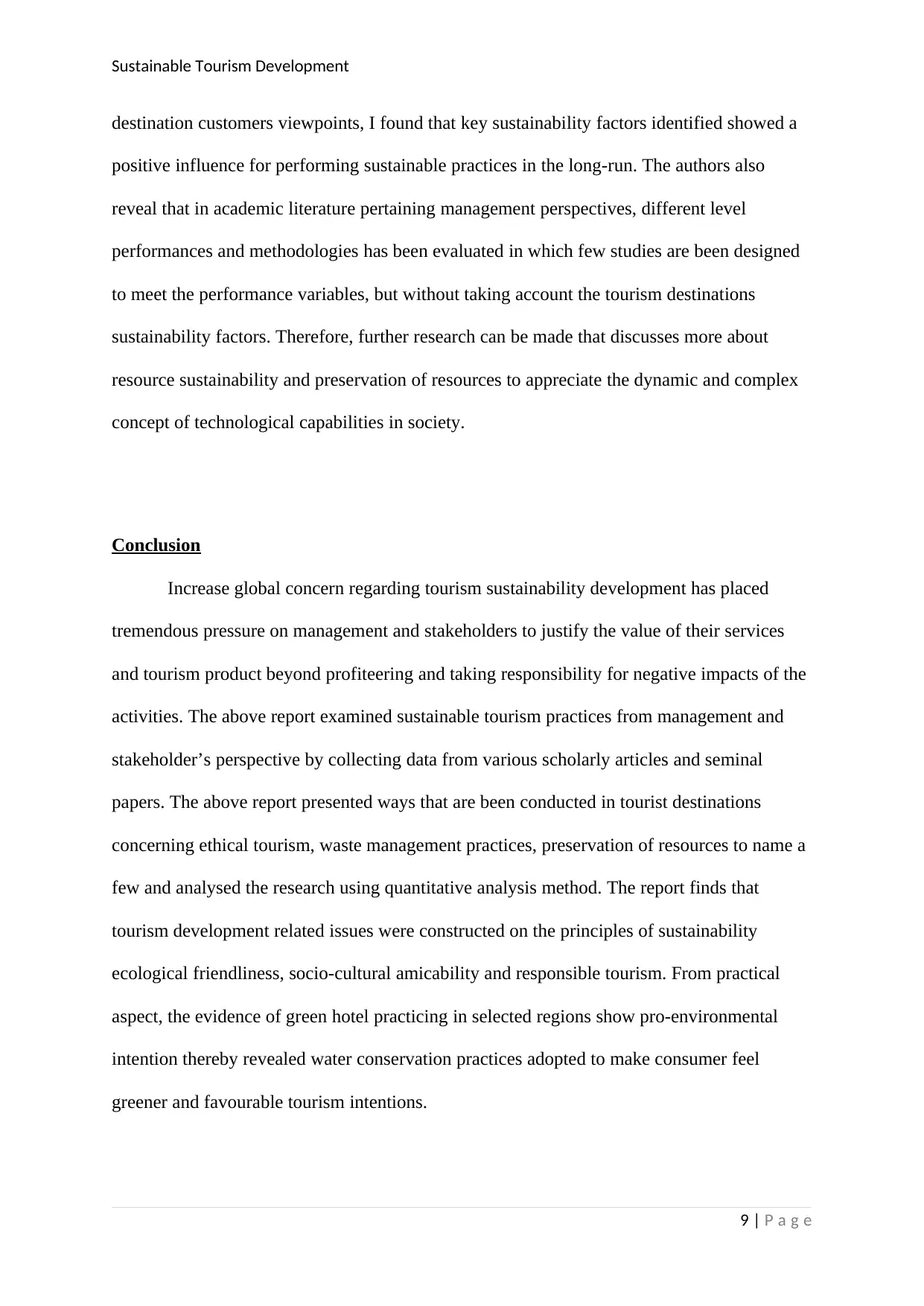
Sustainable Tourism Development
destination customers viewpoints, I found that key sustainability factors identified showed a
positive influence for performing sustainable practices in the long-run. The authors also
reveal that in academic literature pertaining management perspectives, different level
performances and methodologies has been evaluated in which few studies are been designed
to meet the performance variables, but without taking account the tourism destinations
sustainability factors. Therefore, further research can be made that discusses more about
resource sustainability and preservation of resources to appreciate the dynamic and complex
concept of technological capabilities in society.
Conclusion
Increase global concern regarding tourism sustainability development has placed
tremendous pressure on management and stakeholders to justify the value of their services
and tourism product beyond profiteering and taking responsibility for negative impacts of the
activities. The above report examined sustainable tourism practices from management and
stakeholder’s perspective by collecting data from various scholarly articles and seminal
papers. The above report presented ways that are been conducted in tourist destinations
concerning ethical tourism, waste management practices, preservation of resources to name a
few and analysed the research using quantitative analysis method. The report finds that
tourism development related issues were constructed on the principles of sustainability
ecological friendliness, socio-cultural amicability and responsible tourism. From practical
aspect, the evidence of green hotel practicing in selected regions show pro-environmental
intention thereby revealed water conservation practices adopted to make consumer feel
greener and favourable tourism intentions.
9 | P a g e
destination customers viewpoints, I found that key sustainability factors identified showed a
positive influence for performing sustainable practices in the long-run. The authors also
reveal that in academic literature pertaining management perspectives, different level
performances and methodologies has been evaluated in which few studies are been designed
to meet the performance variables, but without taking account the tourism destinations
sustainability factors. Therefore, further research can be made that discusses more about
resource sustainability and preservation of resources to appreciate the dynamic and complex
concept of technological capabilities in society.
Conclusion
Increase global concern regarding tourism sustainability development has placed
tremendous pressure on management and stakeholders to justify the value of their services
and tourism product beyond profiteering and taking responsibility for negative impacts of the
activities. The above report examined sustainable tourism practices from management and
stakeholder’s perspective by collecting data from various scholarly articles and seminal
papers. The above report presented ways that are been conducted in tourist destinations
concerning ethical tourism, waste management practices, preservation of resources to name a
few and analysed the research using quantitative analysis method. The report finds that
tourism development related issues were constructed on the principles of sustainability
ecological friendliness, socio-cultural amicability and responsible tourism. From practical
aspect, the evidence of green hotel practicing in selected regions show pro-environmental
intention thereby revealed water conservation practices adopted to make consumer feel
greener and favourable tourism intentions.
9 | P a g e
Paraphrase This Document
Need a fresh take? Get an instant paraphrase of this document with our AI Paraphraser
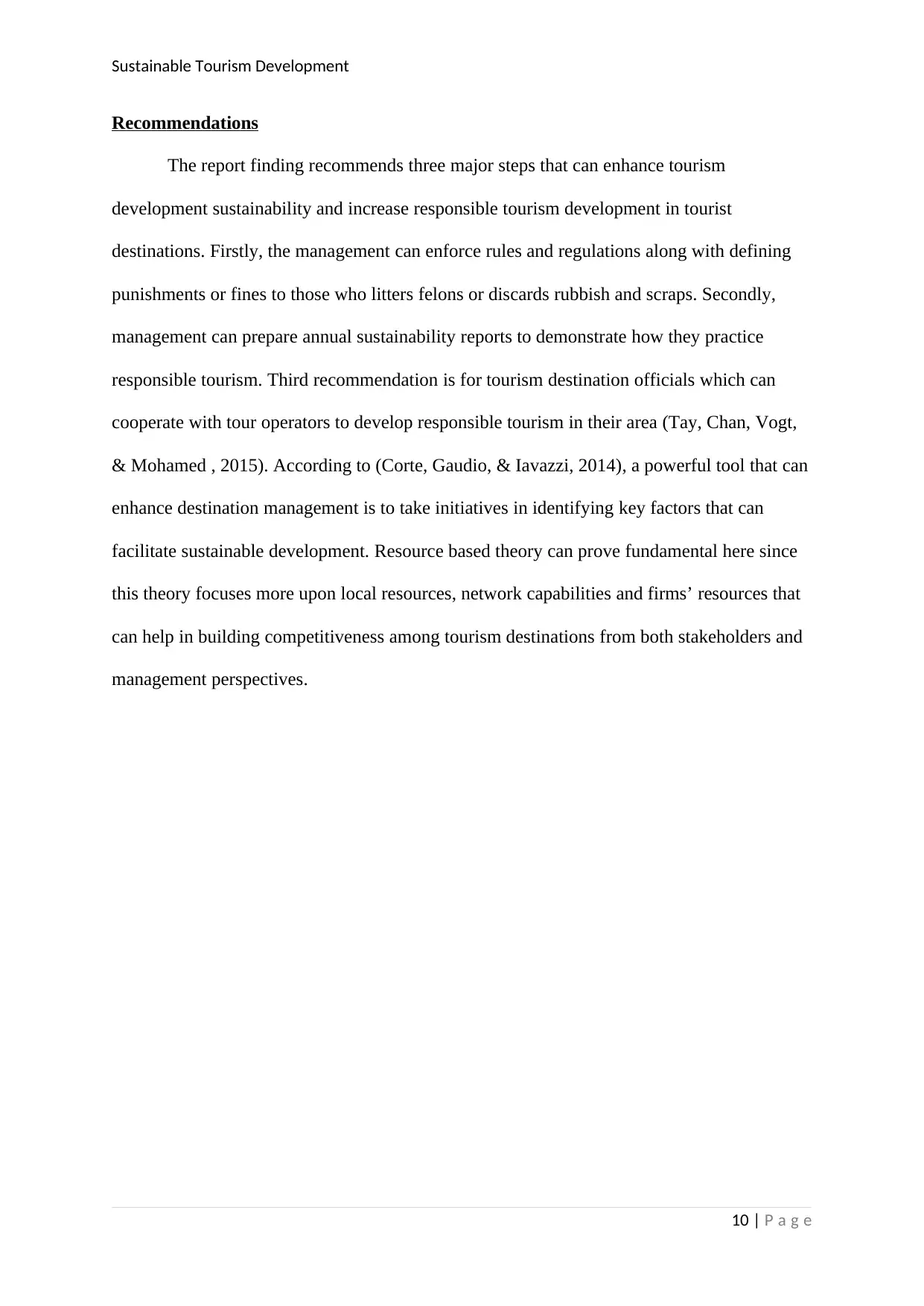
Sustainable Tourism Development
Recommendations
The report finding recommends three major steps that can enhance tourism
development sustainability and increase responsible tourism development in tourist
destinations. Firstly, the management can enforce rules and regulations along with defining
punishments or fines to those who litters felons or discards rubbish and scraps. Secondly,
management can prepare annual sustainability reports to demonstrate how they practice
responsible tourism. Third recommendation is for tourism destination officials which can
cooperate with tour operators to develop responsible tourism in their area (Tay, Chan, Vogt,
& Mohamed , 2015). According to (Corte, Gaudio, & Iavazzi, 2014), a powerful tool that can
enhance destination management is to take initiatives in identifying key factors that can
facilitate sustainable development. Resource based theory can prove fundamental here since
this theory focuses more upon local resources, network capabilities and firms’ resources that
can help in building competitiveness among tourism destinations from both stakeholders and
management perspectives.
10 | P a g e
Recommendations
The report finding recommends three major steps that can enhance tourism
development sustainability and increase responsible tourism development in tourist
destinations. Firstly, the management can enforce rules and regulations along with defining
punishments or fines to those who litters felons or discards rubbish and scraps. Secondly,
management can prepare annual sustainability reports to demonstrate how they practice
responsible tourism. Third recommendation is for tourism destination officials which can
cooperate with tour operators to develop responsible tourism in their area (Tay, Chan, Vogt,
& Mohamed , 2015). According to (Corte, Gaudio, & Iavazzi, 2014), a powerful tool that can
enhance destination management is to take initiatives in identifying key factors that can
facilitate sustainable development. Resource based theory can prove fundamental here since
this theory focuses more upon local resources, network capabilities and firms’ resources that
can help in building competitiveness among tourism destinations from both stakeholders and
management perspectives.
10 | P a g e
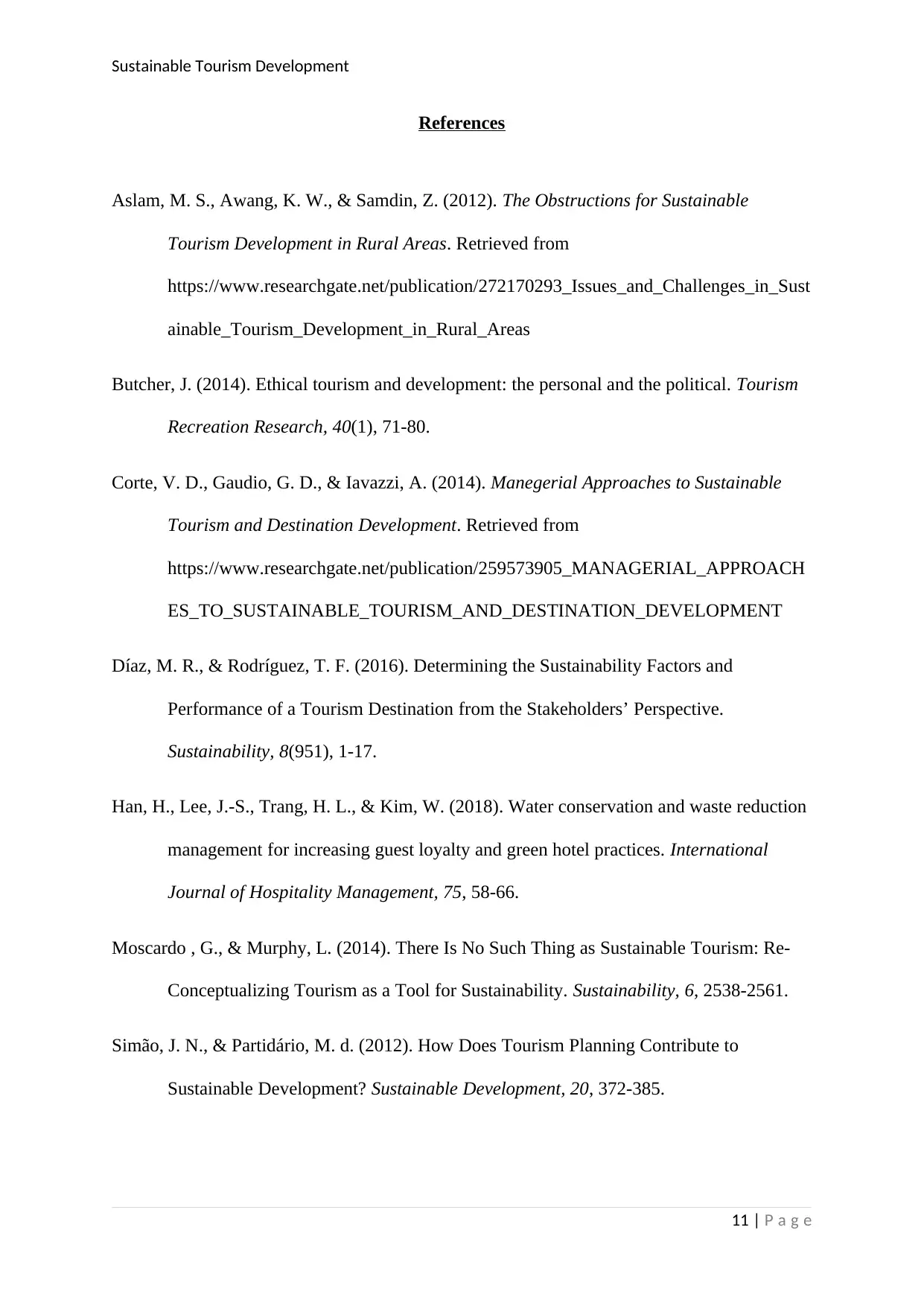
Sustainable Tourism Development
References
Aslam, M. S., Awang, K. W., & Samdin, Z. (2012). The Obstructions for Sustainable
Tourism Development in Rural Areas. Retrieved from
https://www.researchgate.net/publication/272170293_Issues_and_Challenges_in_Sust
ainable_Tourism_Development_in_Rural_Areas
Butcher, J. (2014). Ethical tourism and development: the personal and the political. Tourism
Recreation Research, 40(1), 71-80.
Corte, V. D., Gaudio, G. D., & Iavazzi, A. (2014). Manegerial Approaches to Sustainable
Tourism and Destination Development. Retrieved from
https://www.researchgate.net/publication/259573905_MANAGERIAL_APPROACH
ES_TO_SUSTAINABLE_TOURISM_AND_DESTINATION_DEVELOPMENT
Díaz, M. R., & Rodríguez, T. F. (2016). Determining the Sustainability Factors and
Performance of a Tourism Destination from the Stakeholders’ Perspective.
Sustainability, 8(951), 1-17.
Han, H., Lee, J.-S., Trang, H. L., & Kim, W. (2018). Water conservation and waste reduction
management for increasing guest loyalty and green hotel practices. International
Journal of Hospitality Management, 75, 58-66.
Moscardo , G., & Murphy, L. (2014). There Is No Such Thing as Sustainable Tourism: Re-
Conceptualizing Tourism as a Tool for Sustainability. Sustainability, 6, 2538-2561.
Simão, J. N., & Partidário, M. d. (2012). How Does Tourism Planning Contribute to
Sustainable Development? Sustainable Development, 20, 372-385.
11 | P a g e
References
Aslam, M. S., Awang, K. W., & Samdin, Z. (2012). The Obstructions for Sustainable
Tourism Development in Rural Areas. Retrieved from
https://www.researchgate.net/publication/272170293_Issues_and_Challenges_in_Sust
ainable_Tourism_Development_in_Rural_Areas
Butcher, J. (2014). Ethical tourism and development: the personal and the political. Tourism
Recreation Research, 40(1), 71-80.
Corte, V. D., Gaudio, G. D., & Iavazzi, A. (2014). Manegerial Approaches to Sustainable
Tourism and Destination Development. Retrieved from
https://www.researchgate.net/publication/259573905_MANAGERIAL_APPROACH
ES_TO_SUSTAINABLE_TOURISM_AND_DESTINATION_DEVELOPMENT
Díaz, M. R., & Rodríguez, T. F. (2016). Determining the Sustainability Factors and
Performance of a Tourism Destination from the Stakeholders’ Perspective.
Sustainability, 8(951), 1-17.
Han, H., Lee, J.-S., Trang, H. L., & Kim, W. (2018). Water conservation and waste reduction
management for increasing guest loyalty and green hotel practices. International
Journal of Hospitality Management, 75, 58-66.
Moscardo , G., & Murphy, L. (2014). There Is No Such Thing as Sustainable Tourism: Re-
Conceptualizing Tourism as a Tool for Sustainability. Sustainability, 6, 2538-2561.
Simão, J. N., & Partidário, M. d. (2012). How Does Tourism Planning Contribute to
Sustainable Development? Sustainable Development, 20, 372-385.
11 | P a g e
⊘ This is a preview!⊘
Do you want full access?
Subscribe today to unlock all pages.

Trusted by 1+ million students worldwide
1 out of 13
Related Documents
Your All-in-One AI-Powered Toolkit for Academic Success.
+13062052269
info@desklib.com
Available 24*7 on WhatsApp / Email
![[object Object]](/_next/static/media/star-bottom.7253800d.svg)
Unlock your academic potential
Copyright © 2020–2026 A2Z Services. All Rights Reserved. Developed and managed by ZUCOL.




